
The Kingdom of Araucanía and Patagonia was an unrecognized state declared by two ordinances on November 17, 1860 and November 20, 1860 from Antoine de Tounens, a French lawyer and adventurer, who claimed that the regions of Araucanía and eastern Patagonia did not depend of any other states and proclaimed himself king of Araucanía and Patagonia. He had the support of some Mapuche lonkos around a small area in Araucanía, who thought they could help maintain independence from the Chilean and Argentinian governments.

The Occupation of Araucanía or Pacification of Araucanía (1861–1883) was a series of military campaigns, agreements and penetrations by the Chilean army and settlers into Mapuche territory which led to the incorporation of Araucanía into Chilean national territory. Pacification of Araucanía was the expression used by the Chilean authorities for this process. The conflict was concurrent with Argentine campaigns against the Mapuche (1878–1885) and Chile's wars with Spain (1865–1866) and with Peru and Bolivia (1879–1883).

Francisca Valenzuela is an American-born Chilean singer, poet, and multi-instrumentalist. Valenzuela was born and raised in San Francisco, California, where she resided until the age of 12, before moving to Santiago, Chile. She gained popularity in Chile and Latin America following the release of her debut album, Muérdete La Lengua, in June 2007. Her second album, Buen Soldado, followed in March 2011. Valenzuela has earned both gold and platinum album certification in Chile.

Chilean cinema refers to all films produced in Chile or made by Chileans. It had its origins at the start of the 20th century with the first Chilean film screening in 1902 and the first Chilean feature film appearing in 1910. The oldest surviving feature is El Húsar de la Muerte (1925), and the last silent film was Patrullas de Avanzada (1931). The Chilean film industry struggled in the late 1940s and in the 1950s, despite some box-office successes such as El Diamante de Maharajá. The 1960s saw the development of the "New Chilean Cinema", with films like Three Sad Tigers (1968), Jackal of Nahueltoro (1969) and Valparaíso mi amor (1969). After the 1973 military coup, film production was low, with many filmmakers working in exile. It increased after the end of the Pinochet regime in 1989, with occasional critical and/or popular successes such as Johnny cien pesos (1993), Historias de Fútbol (1997) and Gringuito (1998).

The Shipwrecked is a 1994 Chilean drama film directed by Miguel Littín. It was screened in the Un Certain Regard section at the 1994 Cannes Film Festival.
The first annual Altazor Awards 2000 took place on March 30, 2000, at the Teatro Municipal de Santiago. The nominees were announced on March 20.
The fifth annual Altazor Awards took place on April 5, 2004, at the Centro Cultural Matucana 100. The nominees were announced on January 22.

The Life of Fish is a 2010 Chilean drama film directed by Matías Bize. The film was selected as the Chilean entry for the Best Foreign Language Film at the 83rd Academy Awards, but didn't make the final shortlist.
40 y Tantos is a Chilean telenovela produced by TVN and directed by María Eugenia Rencoret and Ítalo Galleani. The series was written by Marcelo Leonart, Ximena Carrera, Andrea Franco, Carla Stagno and José Fonseca.

Marcela Paz Said Cares is a Franco-Chilean director and screenwriter.

Valió la Pena, also known as My Little Dilemma is a Chilean television soap opera, that aired on Canal 13 from October 19, 2014, to February 19, 2015, starring Lorena Bosch, Francisco Pérez-Bannen and Cristián Arriagada.

Matías Bize is a Chilean film director, producer and screenwriter. He has won important independent film awards including the Espigo de Oro for In Bed at the 2005 Valladolid International Film Festival in Spain, and a Goya Award in 2011 for The Life of Fish.
Inti Briones Arredondo is a cinematographer, film producer. He is known for his work in various media formats, media digital video and motion picture film. In 2013, he was named as one of Variety Magazine's "10 Cinematographers to Watch.". His work has been noted for the sensitivity with which he approaches both rural and urban locations in different parts of the world. He has worked with Chilean filmmakers such as Raúl Ruiz, José Luis Torres Leiva, Cristián Jiménez, Alejandro Fernández Almendras and Dominga Sotomayor Castillo. Briones grew up in Lima with his Chilean mother, Sybila Arredondo, widow of José María Arguedas. At the age of 15, in Peru, he entered the Armando Robles Godoy Film and Television School. In his early 20's, he moved to Santiago, Chile; although he had already taken film courses in Peru and workshops in France, he was determined to study with Héctor Ríos Henríquez, director of photography of El chacal de Nahueltoro.

María Francisca Gavilán Valladares is a Chilean film, theater, and television actress and singer.
Conde Vrolok is a telenovela produced and broadcast by Televisión Nacional de Chile (TVN) in 2009, succeeding ¿Dónde está Elisa? Recording began on 11 August and the first episode aired on 3 November of that year. With an average rating of 44.2 points, between 10:38 and 11:16, and a peak of 54, it became the most successful debut of a TV series in the TVN night slot, which can be largely attributed to the popularity of the aforementioned telenovela which it replaced.

Pedro César Cayuqueo Millaqueo is a Mapuche-Chilean journalist and activist involved in the Mapuche struggle.

Marcela Osorio Méndez is a Chilean film and television actress.

Francisca Linconao Huircapán, also known as Machi Linconao, is a machi and human rights activist in Chile. She became the first Indigenous rights defender in Chile to successfully invoke the 1989 Indigenous and Tribal Peoples Convention when she sued to stop a company from logging a forest adjacent to her community. In 2021, she was elected as a representative of the Mapuche people to the Chilean Constitutional Convention election.

Hecho bolsa is a 2019 Chilean comedy film written, directed, produced, starred, filmed, scored and edited by Felipe Izquierdo who is accompanied by Bélgica Castro, Julio Jung, Erick Polhammer, Francisca Imboden and Fernando Larraín. It is based on the tetral monologue of the same name by the same director. It premiered on August 8, 2019, in Chilean theaters.














